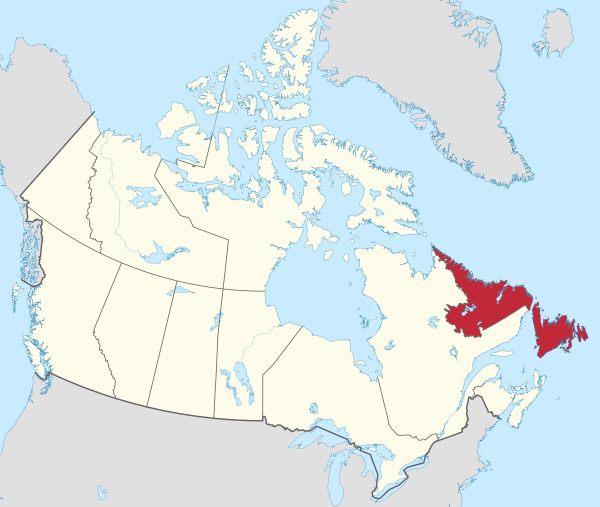
This post originally posted on 7th August 2023
Source of most of this post is Wikipedia
NEWFOUNDLAND AND LABRADOR
Newfoundland and Labrador (/njuːfənˈlænd ... ˈlæbrədɔːr/; French: Terre-Neuve-et-Labrador; frequently abbreviated as NL) is the easternmost province of Canada, in the country's Atlantic region. The province comprises the island of Newfoundland and the continental region of Labrador, having a total size of 405,212 square kilometres (156,500 sq mi). In 2023, the population of Newfoundland and Labrador was estimated to be 533,710. The island of Newfoundland (and its smaller neighbouring islands) is home to around 94 per cent of the province's population, with more than half residing in the Avalon Peninsula. Labrador borders the province of Quebec, and the French overseas collectivity of Saint Pierre and Miquelon lies about 20 km (12 mi) west of the Burin Peninsula.
Coordinates: 53°13′48″N 59°59′57″W
Country Canada
Confederation March 31, 1949 (12th)
Capital (and largest city) St. John's
Largest metro Greater St. John's
Government
• Type
Parliamentary constitutional monarchy
• Lieutenant governor
Judy Foote
• Premier
Andrew Furey
Legislature
Newfoundland and Labrador House of Assembly
Federal representation Parliament of Canada
House seats 7 of 338 (2.1%)
Senate seats 6 of 105 (5.7%)
Area
• Total
405,720 km2 (156,650 sq mi)
• Land
373,872 km2 (144,353 sq mi)
• Water
31,340 km2 (12,100 sq mi) 7.7%
• Rank
10th - 4.1% of Canada Population (2021)
• Total - 510,550[2]
• Estimate (Q2 2023) - 533,710[3]
• Rank - 9th
• Density - 1.37/km2 (3.5/sq mi)
Demonym(s)
Newfoundlander
Labradorian
Official languages - English
GDP
• Rank - 8th
• Total (2011) - C$33.624 billion
• Per capita - C$65,556 (5th)
HDI
• HDI (2019) - 0.894[6] — Very high (13th)
Time zones - Newfoundland
UTC-03:30 (Newfoundland Time Zone)
Labrador (Black Tickle and North)
UTC-04:00 (Atlantic Time Zone)
Canadian postal abbr.
NL (formerly NF)
Postal code prefix
A
ISO 3166 code
CA-NL
Flower - Pitcher plant
Tree- Black spruce
Bird - Atlantic puffin
According to the 2016 census, 97.0 per cent of residents reported English as their native language, making Newfoundland and Labrador Canada's most linguistically homogeneous province. A majority of the population is descended from English and Irish settlers, giving Newfoundland its reputation as "the most Irish place outside Ireland."[8]
St. John's, the capital and largest city of Newfoundland and Labrador, is Canada's 22nd-largest census metropolitan area and it is home to about 40% of the province's population. St. John's is the seat of the House of Assembly of Newfoundland and Labrador as well as the province's highest court, the Newfoundland and Labrador Court of Appeal.
Until 1949, the Dominion of Newfoundland was a separate dominion in the British Empire. In 1933 the House of Assembly of the self-governing dominion voted to dissolve itself and to hand over administration of Newfoundland and Labrador to the British-appointed Commission of Government. This followed the suffering caused by the Great Depression and Newfoundland's participation in World War I. On March 31, 1949, it became the 10th and newest province to join the Canadian Confederation as "Newfoundland". On December 6, 2001, the Constitution of Canada was amended to change the province's name to "Newfoundland and Labrador".
I am hoping to ad much more and add a glossary. This may turn into a large project.
Bradley
Posted Using LeoFinance Alpha
Congratulations @nl-hive! You have completed the following achievement on the Hive blockchain And have been rewarded with New badge(s)
Your next target is to reach 100 upvotes.
You can view your badges on your board and compare yourself to others in the Ranking
If you no longer want to receive notifications, reply to this comment with the word
STOPCheck out our last posts: